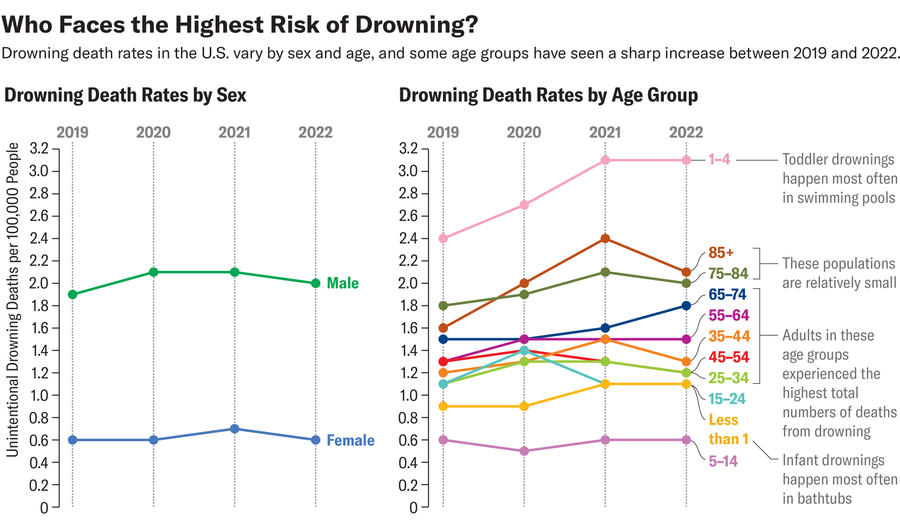August 27, 2024
4 min learn
Grownup Drowning Deaths Are Rising
Most deadly drowning incidents within the U.S. contain adults, not youngsters, they usually typically contain alcohol
Greater than 4,500 folks within the U.S. misplaced their lives in drowning accidents in 2022, the latest yr for which information can be found, and greater than 70 % of them had been adults. There have been a number of notable grownup drowning instances this summer time, together with a seashore incident in Florida that killed three younger males in June and a river tubing accident in Oregon that killed award-winning chef Naomi Pomeroy in July.
Grownup drowning deaths have been growing within the U.S. A latest report by the Facilities for Illness Management and Prevention discovered that unintentional drowning demise charges elevated in nearly each grownup age group between 2020 and 2022, when the COVID pandemic led to pool closures and lifeguard shortages.
The rise “was concerning because drowning death rates in the United States had been decreasing for the last two decades,” says Briana Moreland, a CDC researcher, who co-authored the report. The explanations behind the pattern aren’t completely clear, however as famous in an earlier report from the company, folks spent extra time recreating exterior in the course of the pandemic, and boat gross sales elevated. Studying extra concerning the elements that contribute to grownup drownings may assist researchers develop higher prevention methods.
On supporting science journalism
Should you’re having fun with this text, take into account supporting our award-winning journalism by subscribing. By buying a subscription you’re serving to to make sure the way forward for impactful tales concerning the discoveries and concepts shaping our world at present.

Regardless of the upper incidence, grownup drownings are inclined to obtain far much less consideration than childhood instances do, partly as a result of toddlers have the best drowning demise charges within the U.S. Drowning prevention campaigns usually give attention to selling youngsters’s swimming classes and characteristic images of younger youngsters in swimming swimming pools. “Drowning prevention has been entirely too focused on the child, and that’s a weird thing coming from a pediatrician,” says Linda Quan, a pediatric drowning skilled on the College of Washington. “It’s terrible to lose a child, but it can also be devastating for a child to lose a parent. It affects the whole family.”
One issue that differentiates grownup and childhood drownings is the water sources concerned. Whereas younger youngsters usually tend to drown in bathtubs and swimming swimming pools, most grownup drowning incidents happen in pure our bodies of water, resembling rivers and the ocean, which might include hidden risks, together with currents and steep drop-offs, even after they seem calm. “Every natural waterway is different,” says Adam B. Katchmarchi, CEO of the Nationwide Drowning Prevention Alliance, a nonprofit that research and promotes water security. “Sometimes we underestimate the power of water. And as an adult, it’s easy to think that nothing bad will happen.”
Grownup drowning incidents additionally continuously contain alcohol, which might impair judgment and coordination. “If you’re intoxicated, and you fall into water, your ability to coordinate your breathing and muscular movements will certainly not be as crisp as it is when you’re sober,” says Stephen Hargarten, a professor of emergency medication on the Medical Faculty of Wisconsin, who has written about drowning. Working boats whereas inebriated is already unlawful within the U.S., and alcohol is banned at many public seashores, too. However, alcohol stays the main issue related to deadly boating accidents within the U.S., which killed 564 folks final yr—most of them by drowning, in keeping with the U.S. Coast Guard.
One other issue that impacts how adults behave round water is their perceived swimming means. For instance, research by Quan and different researchers have discovered that many boaters assume that solely inexperienced swimmers must put on life jackets. Males are particularly prone to fee themselves as succesful swimmers, however the latest CDC report discovered that fewer than half of U.S. male adults had ever taken a swimming lesson.
Understanding male drowning deaths is necessary as a result of male people are essentially the most in danger in all ages group, accounting for about 75 % of unintentional drowning deaths within the U.S. Proof means that males and boys usually tend to have interaction in risk-taking behaviors on the whole. This will increase their probability of dying from causes of harm deaths apart from drowning, resembling motorized vehicle crashes. However misperceiving their swimming skills can also forestall them from precisely figuring out their danger stage round water. A New Zealand-based examine printed earlier this yr discovered that male adults constantly overestimated how far they might swim, significantly in pure water sources. Maybe most regarding, most of the male examine contributors continued to overestimate their swimming skills even after a area take a look at revealed their deficiencies.
Swimming abilities alone can’t forestall an individual from drowning. Consultants on the American Pink Cross and differentorganizations name for added layers of safety, together with lifeguards and life jackets. Nonetheless, swimming classes present a chance to show youngsters and adults about water questions of safety, resembling pure water hazards, in addition to the standard swimming strokes. The U.S. Nationwide Water Security Motion Plan, which was launched by an interdisciplinary coalition of specialists final yr, recommends bettering entry to swimming and water security coaching for all age teams, significantly amongst populations, resembling Native American, Alaska Native and Black folks, who’ve disproportionately excessive deadly drowning charges as youngsters and adults. “Our message is that swimming is for everyone,” says Katchmarchi, who helped draft the plan. “These skills are relevant to everyone’s safety.”

